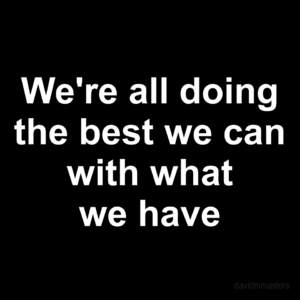If you’ve ever hurt someone you loved, made a decision that lead to an outcome you didn’t want or expected, said something with your outside voice that you knew once it was out you wished you could have taken it back, or asserted yourself in such a way as to cause conflict or distress for someone else you might be a toxic person.
Let’s take a look at signs which might indicate that you, or someone you know, might be a toxic person.
If you’re telling your partner what to wear or what not to wear, what activities to participate in, what friends to hang out with, what to do, or where to go, you might be a toxic person.
If you’re constantly getting attention or resources from others without giving much, if anything, in return, you might be a toxic person.
If people reach out to you in an attempt to connect to you and you ignore them, their calls, or their texts, and you generally think others are just plain annoying, unless you want something from them, you might be a toxic person.
If you are handy with putting negative spin on circumstances, often exaggerate, or lie to make yourself look better, or others to appear to be less appealing (or even bad), then make yourself look like God’s gift to save the world (or at least this circumstance), you might be a toxic person.
If you have a knack for using the exact words that people say or recall people’s actions and responses in intricate detail to twist and weaponize against others to make them look bad, potentially destroying their lives, you might be a toxic person.
If you use something that someone’s told you in confidence against them or use it to put yourself in a better light or to make you seem superior or less-flawed than someone else, you might be a toxic person.
If you take someone else’s words out of context, make it look as though it was an attack against you or your integrity, and counterattack, just to assert how better a person you are, and how awful the other person is to even question you or your integrity, you might be a toxic person.
If you have a tendency to pick on or torture people emotionally because they are gentle, kind, loving, and giving people who you see as somewhat weaker than they should be, and maybe feel like you’re doing them a favor by making them a little tougher by challenging their sensibilities with a little conflict, drama, or abuse, you might be a toxic person.
If you brag about your accomplishments, and feel free to embellish a little to make your personal stories even more fascinating and disregard the accomplishments of others, you might be a toxic person.
If your constantly making excuses for yourself for not fulfilling your end of the bargain, blaming others for your lack of diligence or commitment when you fall short of the mark, you might be a toxic person.
If you lack integrity, which means that you’re more prone to lie than not and find it hard to keep promises of make good on the things you say with the things you do, you might be a toxic person.
If someone you know is doing something you don’t agree with, and you use guilt, some form of self-deprecation, or throw a pity party to get them to change their plans on your behalf, you might be a toxic person.
If you generally feel that other people are not up to your standards in one way or another, and you feel like it’s up to you to see them change to come more in-line with your way of thinking, being, acting, or living, you might be a toxic person.
If you are constantly seeing the shortcomings in others and often find yourself trying to make them change to better suit your standards, you might be a toxic person.
If you are likely to abuse someone else by disrespecting them, raising your voice, intimidating, belittling, threatening them, or even potentially committing acts of violence to get your way, you might be a toxic person.
If your first reaction is to be jealous with the potential of escalating to rage when your partner is out of range of your discerning watchful eye (and you assume that he or she will be unfaithful to you), you might be a toxic person.
If you look deep within and you find that of all people you know you cannot be trusted, and this leads you to the conclusion that no one else can be trusted, then you might be a toxic person.
But before you go jumping to self-martyrdom about your being a toxic person, let me put your mind at ease. First of all, if you’re wondering if you might be a toxic person, then you’re probably not toxic at all.
We all make mistakes and blunder through life and we’re all doing the best we can with what we have, and sometimes, we do better than other times. No problem, more than likely you’ll get another chance to do it better somewhere further down the road along your life’s path.
So, congratulations! You’re not a toxic person!
Toxic people are a different breed, they muscle their way through life, pushing everyone else out of their way, leaving a wake of emotional destruction in their wake, without a thought of how their attempts to satisfy themselves might affect others.
This is not an uncommon occurrence. For the toxic person, it is a way of life, and in most cases, they are not too bothered by their inconveniencing others or causing them hurt feelings or hardship. They just keep pushing and prodding, moving whatever gets in their way aside to get what they want.
When dealing with toxic people, try not to judge them for being broken or wicked. You do not know what lifetime of living might turn someone into a person, like that. Try to have compassion for them, but steer free from them, because you are never expected to suffer at the hands of someone else. It is your responsibility to protect your own sacred space.








